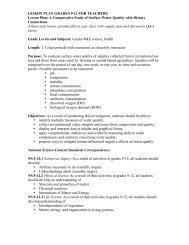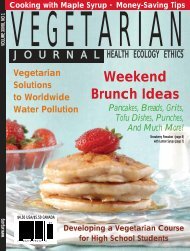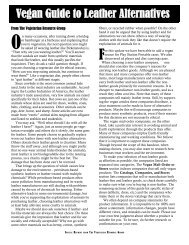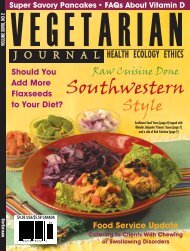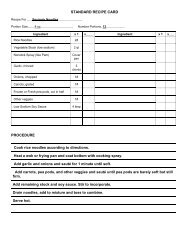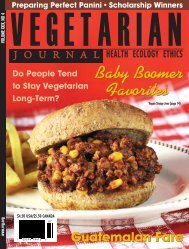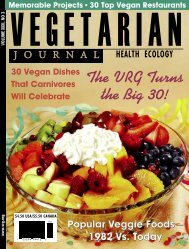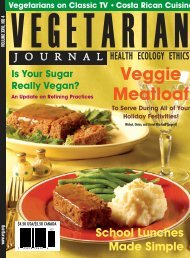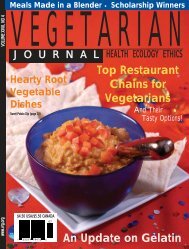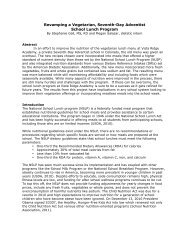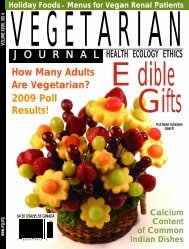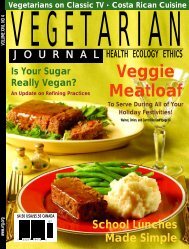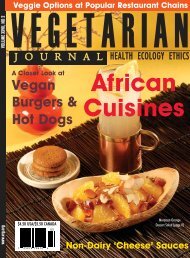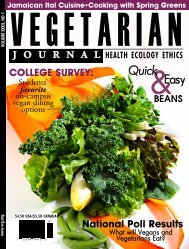Using Dried Fruit - The Vegetarian Resource Group
Using Dried Fruit - The Vegetarian Resource Group
Using Dried Fruit - The Vegetarian Resource Group
Create successful ePaper yourself
Turn your PDF publications into a flip-book with our unique Google optimized e-Paper software.
link between childhood dairy intake and adult cancers.<strong>The</strong> initial information for this study was collectedclose to 70 years ago in Great Britain. Approximately5,000 children were studied, and their dairy intake wasestimated based on the amount of dairy products usedby their household. <strong>The</strong> children were tracked throughadulthood, and the investigators identified those whohad developed cancer. High childhood dairy intake(including milk, cheese, and ice cream) was associatedwith an increased risk of colorectal cancer but not withan increased risk of breast, prostate, or stomach cancer.Higher milk intake (a little more than a cup of milkdaily) in childhood was also associated with an increasedrisk of colorectal cancer and a decreased risk of prostatecancer in adulthood. <strong>The</strong> study’s researchers speculatethat dairy intake in childhood may affect the functioningof the immune system and thereby increase cancerrisk, although this is only one possibility.Van der Pols JC, Bain C, Gunnell D, et al. 2007.Childhood dairy intake and adult cancer risk:65-y follow-up of the Boyd Orr cohort. Am JClin Nutr 86:1,722-29.Obesity May ReduceHealth Care CostsObesity may reduce health care costs? That statementseems counterintuitive. After all, doesn’t obesity leadto medical problems that increase health care costs?A recent report from the Netherlands suggests otherwise.This study, conducted with computer modeling,predicted that preventing obesity can help people tolive longer. People who live longer have higher healthcare costs, especially in the later years. Obese peoplehave higher medical costs than do non-obese people,if you compare them from one year to the next.However, obesity increases risk for diseases like diabetesand heart disease, which frequently results ina shorter lifespan. This shorter lifespan in those withobesity tends to lower lifelong medical costs.<strong>The</strong> question of the impact of longer life on healthcare costs has not been directly studied with vegetarians.Some studies of vegetarian Seventh-day Adventists suggestthat they take less medicine and have fewer hospitalstays than do non-vegetarians, possibly resulting ina reduced health care cost compared to non-vegetarians.Should these results be used to slash funding forobesity prevention programs? Of course not! Obesityprevention does not have to reduce health care costs tobe important. Obesity can cause suffering and death,so any interventions that can help people live longer,healthier lives should be pursued, regardless of thehypothetical potential for increased health care costsdue to the resultant longer lifespan.van Baal PHM, Polder JJ, deWit GA, et al. 2008.Lifetime medical costs of obesity: Prevention nocure for increasing health expenditure. PLoS Med5(2): e29. doi:10.1371/journal. pmed.0050029.Nuts — More May Be LessIf you eat several handfuls of nuts every day in additionto your usual food intake and don’t increase your activity,you’ll gain weight, right? That’s what we’d expect tohear since those several handfuls of nuts would supplyseveral hundred calories more than you usually takein, and extra calories lead to weight gain. Imagine howsurprised researchers must have been when they lookedat studies where subjects were fed nuts in addition totheir usual food and either did not gain weight or didnot gain as much weight as would be expected basedon the extra calories. This has been seen in studies usingalmonds, peanuts, pecans, walnuts, and macadamianuts. How could this be?Researchers in Ghana, Brazil, and the United Stateshypothesized that the nuts were not being completelyabsorbed—that some of the nuts’ calories were nevergetting into the subjects’ bodies. To test this, they gavehealthy men and women approximately 2 ounces ofpeanuts, peanut butter, peanut oil, or peanut flour.<strong>The</strong>n, they measured how much fat appeared in thesubjects’ stools. Any fat that showed up in their stoolswas fat that had not been absorbed and representedcalories that were unavailable. <strong>The</strong> group that atepeanuts had significantly more fat in their stools andlost more calories through this route. Approximately athird of the fat the peanuts should have supplied to thebody actually was excreted in the stool. This loss maybe due to an inability to absorb all of the fat in peanuts,possibly because the nuts were not completely digested.While the results of this study should not be takento mean that nuts can be eaten without regard to theircalories, they do suggest that limited amounts of nutscan be used as a part of a healthy diet without necessarilyresulting in weight gain.Traoret CJ, Lokko P, Cruz ACRF, et al. 2008. Peanutdigestion and energy balance. Int J Obes 32:322-28.Thanks to Jay Lavine, MD, for pointing out this article.VEGETARIAN JOURNAL Issue Three 2008 25



